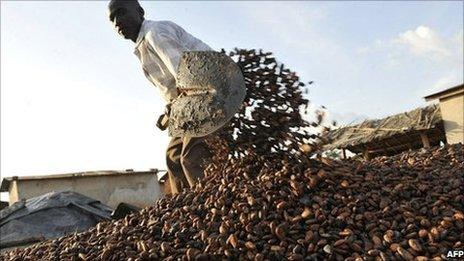Cocoa farmers: A mirror to Ivory Coast's divisions
- Published

Ivory Coast's cocoa farmers hold the country's future in their hands in Sunday's presidential run-off.
The preferred candidate of the central Baoule ethnic group was eliminated in the first round of voting, leaving the farmers playing the role of king makers.
Tension is high in the centre-west region where many of the Baoule farmers live as migrant workers, currently harvesting cocoa for chocolate.
Meanwhile leaflets calling for migrants to be driven off the land have been widely circulated - inflaming tensions after the first round of voting on 31 October.
"To vote, it's not easy at all," said Ahoutro Kouassi, a Baoule tribal chief in the town of Gagnoa, the home town of President Laurent Gbagbo.
"If you haven't accepted to vote how they say, they beat you up around the corner."
Rural rivalry
Sunday's vote sees Mr Gbagbo take on former IMF economist Alassane Ouattara, in a run-off intended to reunite the country eight years after a civil war.
The stakes are high and the contest is getting personal with each side accusing the other of being responsible for the coups and conflicts of the past 11 years, which left the New Forces rebel group in control of the north.
Sunday's battle between Mr Ouattara and Mr Gbagbo has strong fault lines; respectively, north v south, Muslim v Christian, economist v historian, liberal v socialist and technocrat v populist.
Disputed elections could see the emergence of the violent street protests seen at the height of the civil war.
But a peaceful outcome would pave the way for resurgence in economic growth, in a country that was once known as the economic miracle of West Africa.
The central Baoule farmers - from the country's largest ethnic group - voted massively for one of their own in the first round - former President Henri Konan Bedie.
But he came in third with 25% of the vote and is now calling on his supporters to vote for Mr Ouattara.
In the centre-west, Baoule cocoa farmers work alongside northerners and foreigners, who have all migrated to the area to farm land traditionally owned by the original inhabitants of the area, Mr Gbagbo's Bete ethnic group.
This creates tensions as migrant communities are likely to support Mr Ouattara, who hails from the north, and the original inhabitants of the area who generally vote for President Gbagbo.
There is little protection in the rural villages far from the eyes of the Ivorian police and the 8,000-plus UN peacekeepers in the country.
Footballers urge peace
"We need to ask people to be calm and not to make any threats so that things can be more peaceful," said Emile Kambou, who works for Ivorian Human Rights Movement (MIDH) in Gagnoa.
They are calling on the authorities to beef up security in the cocoa belt for this weekend's election.
For now, intimidation has mainly been verbal, but MIDH confirm two Baoule farmers were beaten up and needed to be hospitalised. The farmers have since fled to their home region.
"I hope that both presidential candidates will encourage their supporters to respect the right of all Ivorians to choose their leader without fear of intimidation or reprisal," said former Ghanaian President John Kufuor, who heads an election mission from the Carter Center.
Ivory Coast's football stars have also got involved, with Didier Drogba, Yaya and Kolo Toure and Gervinho calling for peaceful elections.
The Baoule make up around 23% of the population and their traditional region lies in the centre of the country, particularly around the Ivorian capital Yamoussoukro.
Ivory Coast's first President Felix Houphouet-Boigny was a cocoa-farming Baoule chief who made Yamoussoukro, his home town, the capital in 1983.
After Houphouet-Boigny's death in 1993, Mr Bedie, also a Baoule, became president until he was overthrown in a coup in 1999.
Mr Ouattara promises that if he is elected president on Sunday, Mr Bedie, 76, would be his "boss" and that he would immediately start governing from Yamoussoukro, until now a capital in name only.
Both candidates are fighting hard to secure the Baoule vote.
In the last couple of weeks, Mr Ouattara held a political rally in the capital with about 2,000 Baoule chiefs and paid his respects at the tomb of Houphouet-Boigny.
Mr Gbagbo followed with a political rally in Sakassou, home to the Baoule's traditional queen mother, along with 2,500 tribal chiefs from the Akan people, a larger ethnic grouping that encompasses the Baoule.
"Each side is trying to gain the Baoule camp for their own," said George Kouame, a Baoule man shopping at one of the main markets in Yamoussoukro.
"We don't have a problem with Bedie calling on us to vote Ouattara, but this a democracy and everyone will chose for themselves," he said.